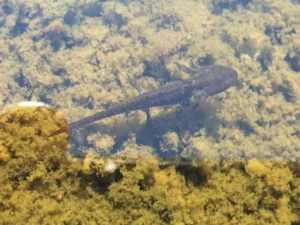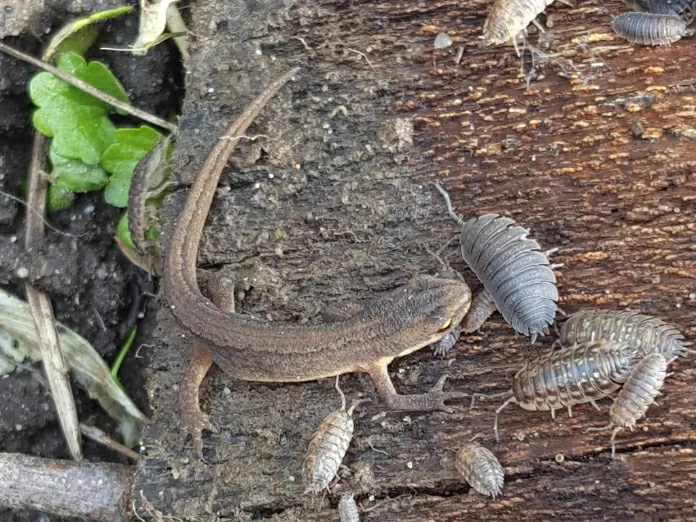When you watch a newt slowly making its way through your garden or swimming in a pond, you might wonder what it’s looking for to eat. So are newts carnivores, herbivores, or omnivores?
Newts are carnivores. They eat only animal matter and don’t eat plants as part of their diet. They hunt insects, worms, small crustaceans, and other tiny creatures both on land and in water.
This all-meat diet affects almost everything about how newts behave, where they hunt, and how they’ve evolved to catch and process their prey.
What Do Adult Newts Actually Eat?
Adult newts eat lots of different animals, and what they choose depends on where they are and what’s around.
On land, they hunt soft-bodied creatures like slugs, earthworms, and insects they can overpower and swallow.

In water, especially during breeding season, their menu grows to include aquatic prey like water fleas, mosquito larvae, small worms, and other tiny water creatures.
Newts are opportunistic hunters. They eat whatever suitable prey they can find and catch.
Their eyes and sense of smell help a lot. Good underwater vision lets them spot moving prey, and a strong sense of smell helps them find hidden food.
How Do Newts Hunt Their Prey?
Newts are ambush predators. They move slowly and wait for prey to come close before striking.
When a newt sees prey, it uses a quick tongue flick or direct bite to grab it. Their tongues aren’t as specialized as frogs, but they work well for catching small, slow-moving prey.
On land, newts often hunt at night. Darkness helps them sneak up on prey and stay hidden from their own predators.
Do Baby Newts Eat the Same Things?
Baby newts, called larvae, are still carnivores but eat different prey than adults.
They live in water and start by eating tiny creatures like water fleas, microscopic worms, and other small aquatic animals.

As they grow, they move on to bigger prey, like mosquito larvae and small aquatic insects.
Sometimes larvae eat each other if food is scarce or siblings are very different in size. This cannibalism may seem harsh, but it helps some survive when food is limited.
Why Don’t Newts Eat Plants?
You might wonder why newts stick to meat when plants are around.
The answer is their bodies. Newts’ digestive systems aren’t built to break down plants.
They have short, simple intestines that work great for animal proteins and fats but can’t handle tough plant fibers.
Their stomachs and intestines produce enzymes that are perfect for digesting animal tissue, but plants would just pass through without giving much nutrition.
How Much Do Newts Need to Eat?
Being cold-blooded gives newts an advantage with food. They need much less than warm-blooded animals of the same size because they don’t burn energy to stay warm.
A newt can survive weeks without eating, especially in cool weather when its metabolism slows.
During active periods, newts usually eat every few days. How often depends on temperature, prey availability, and the newt’s energy needs.
Do Different Newt Species Eat Different Things?
All newts are carnivores, but diets vary by size, habitat, and hunting skill.
Bigger newts can eat bigger prey, while smaller ones stick to tiny creatures.
Aquatic newts have access to water-based prey, while terrestrial species hunt mostly on land. Many switch between water and land hunting depending on their life stage or the season.
Some species are picky, while others eat almost anything small they can catch. The diet stays carnivorous, but prey types vary depending on the environment.
How Does Seasonal Activity Affect Newt Feeding?
Newts change their feeding with the seasons. Warm, active periods are full of hunting.
In winter, most newts enter a slow state like hibernation and barely eat at all. They survive on energy stored during the active months.
When spring arrives, newts feed intensely to rebuild energy and prepare for breeding.
Can You Feed Newts in Captivity?
If you keep newts as pets or in classrooms, you need to follow their carnivorous diet.
Captive newts eat bloodworms, small earthworms, and aquatic invertebrates. Live food is best because it encourages hunting instincts, though some newts accept dead prey.

Make sure all food is the right size. Newts need to swallow it whole.
Varied diets are important to mimic the wild, including the right vitamins and minerals.
How Do Newts Find Food in Murky Water?
When water isn’t clear, newts use more than sight to find prey.
They have a lateral line system, like fish, to sense water movements from swimming prey.
They can also smell chemicals that prey release, letting them track hidden or camouflaged food.
This mix of senses makes newts effective hunters, even when visibility is low.
What Role Do Newts Play in Food Webs?
As carnivores, newts are both predators and prey. They control populations of insects, slugs, and other small animals that might become pests.
At the same time, birds, snakes, and mammals eat newts.
Newts connect small creatures to larger predators, helping balance ecosystems. Their hunting helps keep invertebrate populations in check.
Conclusion
Now you know that newts are strict carnivores. Their diet ranges from tiny water fleas to earthworms and insects.
This all-meat diet shapes how they hunt, digest food, and live in their habitats.
Their bodies have evolved over millions of years to be efficient hunters of small, soft-bodied prey, making them expert predators in both land and water environments.
Hi, my name is Ezra Mushala, i have been interested animals all my life. I am the main author and editor here at snakeinformer.com.

